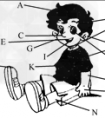根据首字母或中文提示完成单词。1. Many people d________(捐赠) lots of money to the children inpoor areas.2. You can support our work by making a________ (捐赠)-八年级英语
2.宾语:I washed my clothes yesterday. 昨天我洗了我的衣服。
3.表语:This is a good book. 这是一本好书。
4.宾语补足语We selected him our monitor.我们选他为我们的班长。
5.介词宾语Mary lives with her parents.玛丽和她的父母住在一起。
6.定语:She is a Partymember. 她是一位党员。
名词口诀:
一、人和事物各有名,万千名目可辨清。表示名称即名词,具体抽象有不同。
时间空间和地点,方向位置有专称。主宾定表都可作,名词具有多功能。
二、可数名词不可分,若要分离变性质。不可数名词可分离,一分再分仍原物。
英语名词特殊用法:
1.family指“家庭”时,强调全体;指“家里人”时强调个体,与住房无关
home指“家”,表示同一家庭共同生活的地方,具有感情色彩
Kate has left home for school.可作副词也可作名词,意思是“在家”
house指“住宅”、“住房”The Greens live in a big house.
2.man总称“人”、“人类”,用单数
people泛指“人们”,表示复数概念:People often work in the day.
指“人”的个体,但只表示复数概念:There are five people in my family.
前面加定冠词指“人民”,表示复数概念:Let’s work for the people.
指“民族”时,有单、复数之分:The Chinese people is a hardworking people.
person强调“人”的个体,有单、复数之分:There are five persons in my family.
3.police总称“警察”,表示复数概念:
policeman强调“警察”的个体,有单、复数之分:My father is a policeman.
4.universe指“宇宙万物”,强调物质概念:
When we talk about the universe,we mean the earth, the sun,the moon and many other stars.
space指“太空”、“宇宙空间”,强调空间概念:
Many countries have sent up the satellites into space.
“空间”、“余地”、“空地”:There is no space on the bus.
5.不同国家的人的单复数:
|
名称 |
总称(谓语用复数) |
一个人 |
两个人 |
|
中国人 |
the Chinese |
a Chinese |
two Chinese |
|
瑞士人 |
the Swiss |
a Swiss |
two Swiss |
|
澳大利亚人 |
the Australians |
an Australian |
two Australians |
|
俄国人 |
the Russians |
a Russian |
two Russians |
|
意大利人 |
the Italians |
an Italian |
two Italians |
|
希腊人 |
the Greek |
a Greek |
two Greeks |
|
法国人 |
the French |
a Frenchman |
two Frenchmen |
|
印度人 |
the Indians |
an Indian |
two Indians |
|
加拿大人 |
the Canadians |
a Canadian |
two Canadians |
|
德国人 |
the Germans |
a German |
two Germans |
|
英国人 |
the English |
an Englishman |
two Englishmen |
|
瑞典人 |
the Swedish |
a Swede |
two Swedes |
|
日本人 |
the Japanese |
a Japanese |
two Japanese |
|
美国人 |
the Americans |
a American |
two Americans |
考点名称:实义动词的过去式
- 表示一般过去式的动词通常用动词的过去式形式来表示,而动词的过去式是在动词原形的基础上变化的。
动词的过去式可分为规则动词和不规则动词。 实意动词过去式变化规则:
注:以l结尾的动词,尾音节重读时,双写l,如control—controlled;分类 构成 例句 一般情况下 在词尾直接加ed ask—asked
work—worked以不发音的e结尾 只加d love—loved
dance—danced
以辅音字母加y结尾 变y为i,再加-ed try—tried
study—studied以一个元音字母和一个辅音结尾的
重读音节结尾的动词先双写末尾一个字母,再加ed stop—stopped
permit—permitted“-ed”的读音规则 1.在清辅音后面读[t],如:help—helped[helpt]
2.在浊辅音或元音后读[d],如:learn—learned
3.在[t]和[d]后读[id],如:want—wantedneed—needed
尾音节不重读时,双不双写都可以,如travel—traveled/traveled。
特例:picnic—picnicked,另外还有很多动词的过去式是不合乎上述规则的,常见的有:
常用的有:
begin—began, bring—brought, come—came, draw—drew,
drink—drank, drive—drove, eat—ate, feel—felt,
get—got, give—gave, go—went, grow—grew,
have (has)—had, keep—kept, know—knew, leave—left,
make—made, read—read, run—ran, say—said,
see—saw, sit—sat几个特殊实意动词过去式用法:
a.beat的过去式与原形同形:
beat(打击)
beat(过去式)
beaten(过去分词)
b.lie有规则变化和不规则变化两种,含义不同
lie,lied, lied(说谎)
- 最新内容
- 相关内容
- 网友推荐
- 图文推荐
| [家长教育] 孩子为什么会和父母感情疏离? (2019-07-14) |
| [教师分享] 给远方姐姐的一封信 (2018-11-07) |
| [教师分享] 伸缩门 (2018-11-07) |
| [教师分享] 回家乡 (2018-11-07) |
| [教师分享] 是风味也是人间 (2018-11-07) |
| [教师分享] 一句格言的启示 (2018-11-07) |
| [教师分享] 无规矩不成方圆 (2018-11-07) |
| [教师分享] 第十届全国教育名家论坛有感(二) (2018-11-07) |
| [教师分享] 贪玩的小狗 (2018-11-07) |
| [教师分享] 未命名文章 (2018-11-07) |






